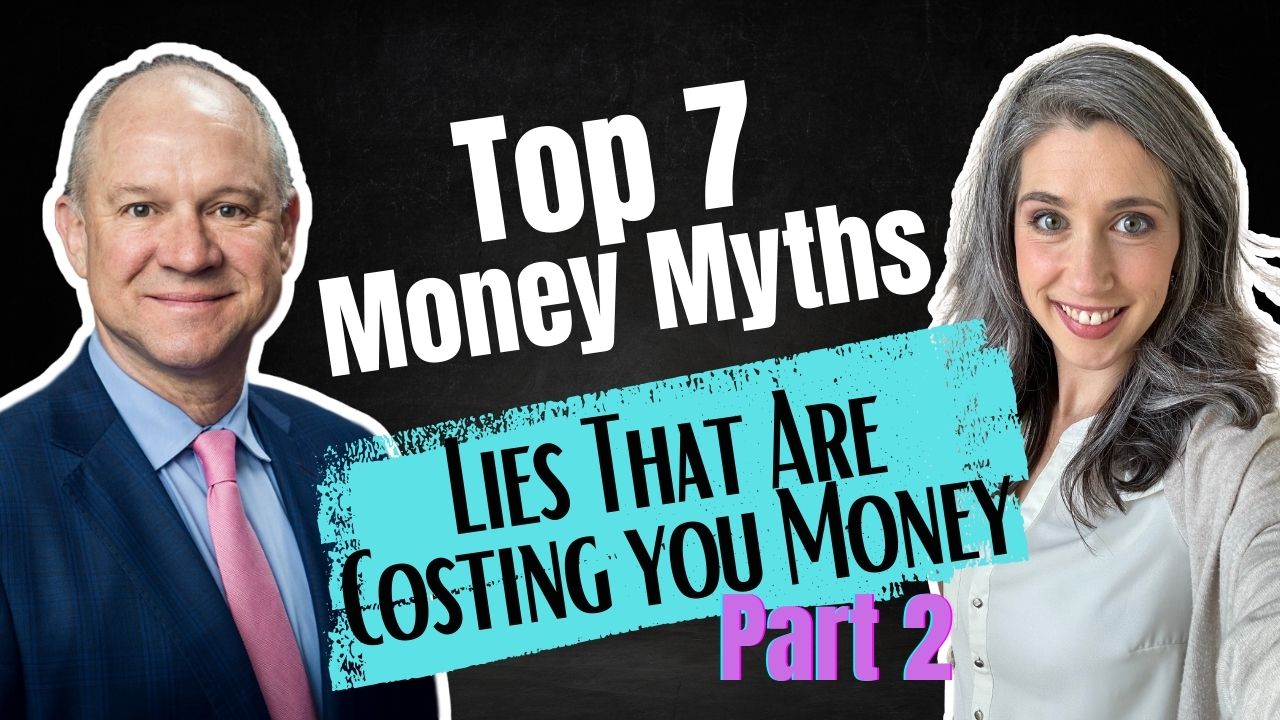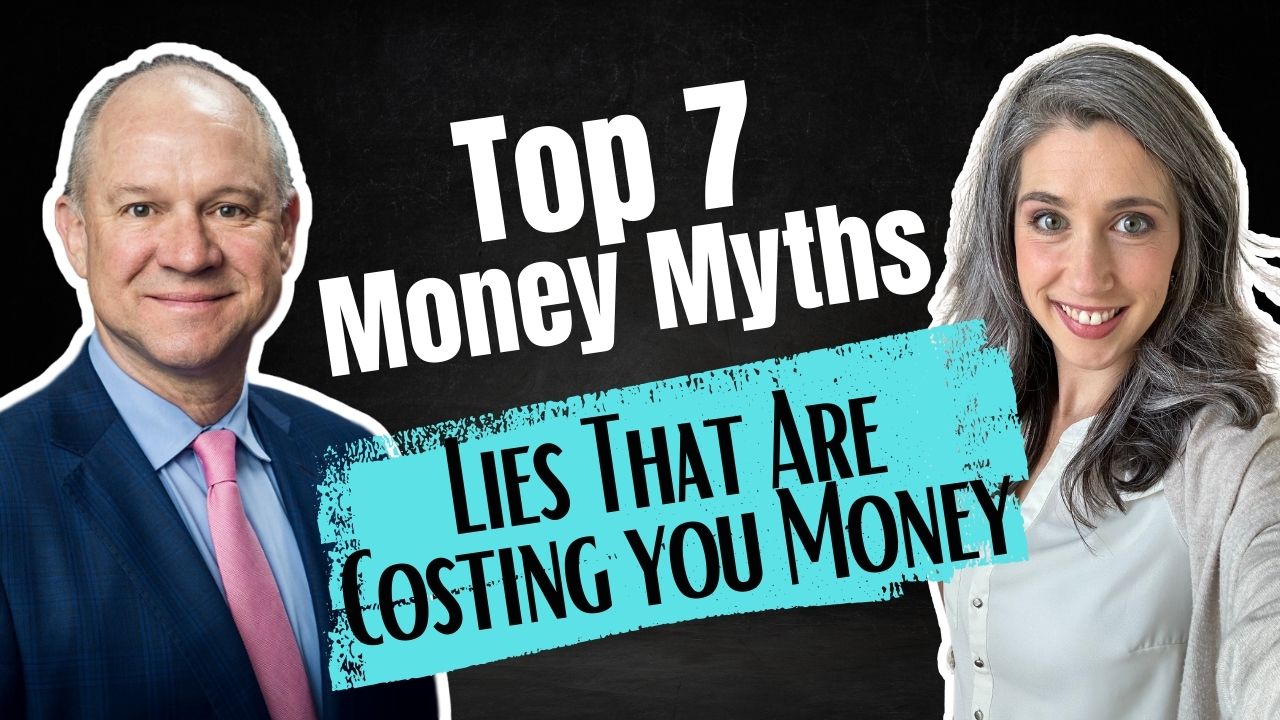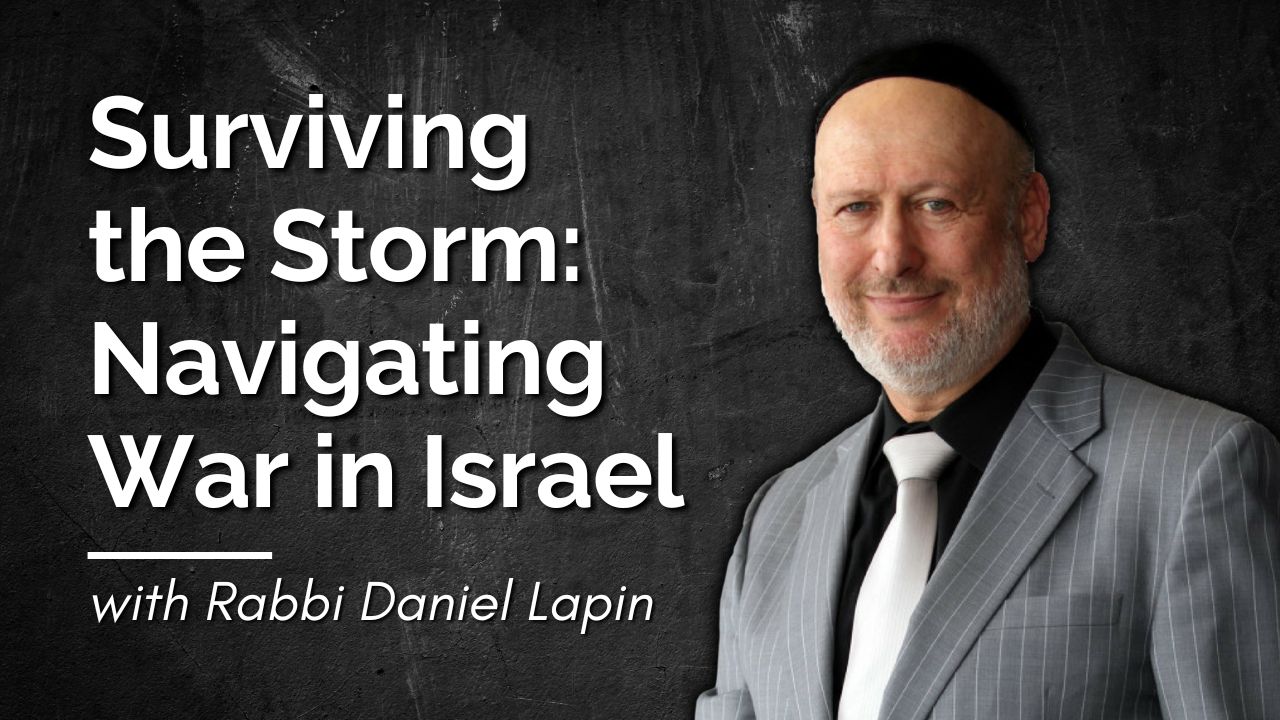
Becoming Your Own Banker, Part 27: 7 Money Myths that are Costing You, Continued
Is what you think about money actually true? Is it helping or hurting you? Moving you forward and expanding your influence, or limiting you and your potential?
If you joined us last week, you know that in true Bruce and Rachel fashion, we only covered half of our intended conversation, so we’re back to reveal more money myths in Part 2.
Here, you’ll get a detox from harmful thinking about money, so you can gain back financial health and control.
Tune in as we continue our series through Nelson Nash’s book, Becoming Your Own Banker, where we discuss retirement plans, the stock market, paying cash, and life insurance needs analysis. And this is one place that the final points to consider might just be the most important part of the book.
If you want to keep more money, have more future income, and live with more peace of mind along the way, join us for down-to-earth real talk about money that you’ll wish you already knew.
Podcast: Play in new window | Download (Duration: 52:53 — 60.5MB)
Subscribe: Apple Podcasts | Spotify | Android | Pandora | RSS | More
Table of Contents
Money Myths that are Costing You Money, Continued
4. Tax-Qualified Plans are Best
The most popular qualified plan, of course, is the 401k. The 401k is an account that allows people to contribute some of their paycheck to be invested on their behalf. Once locked away, that money cannot be accessed without penalty until age 59 and a half. Then, once you do access it, it’s time to pay major taxes.
So why does the 401k have such a grasp on the financial world? Because it’s specifically designed for retirement savings, and it gives people a way to feel like they’re investing and doing something big with their money. And don’t get us wrong—it’s better to save money somewhere than to do nothing at all.
The problem is in thinking that a 401k or an IRA are your only options. After all, these are government-designed products that benefit the government, too. While that alone doesn’t discredit qualified plans, it should stop and make you think.
[12:53] “When a government creates a problem… and then turns around and grants you the exception to the problem they created, aren’t you a little bit suspicious that you’re being manipulated?”
So, if qualified plans are not the best assets to save for retirement, what are the best? The short answer is anything within your control. The longer answer is that you want an asset like whole life insurance where your dollars are preserved, growing, and accessible whenever you want them to be.
[22:50] “Investing is a fabulous idea, but not for the purpose of having safe money. Not for the purpose of having money that you can depend on in the future.”
5. You Should Only Do One Thing
Another common financial myth is that there’s only one right thing to do. This couldn’t be further from the truth. What matters far more is your order of operations. If you invest first, without having savings to support you, it’s going to be unpleasant when you need to dip into your capital and you cannot. So, savings have to come first.
Then, once you have a good foundation, and you have capital that isn’t just secure but is also growing, you can start employing some of those dollars in investments. Those investments can grow, and even if something goes wrong, you’ll still have a solid foundation.
Whole life insurance is an important asset for many reasons, but we aren’t suggesting it’s the only thing you do. We simply recommend it as a starting place that will make all of your future financial decisions that much stronger. And if you are being told that you should only do one thing with your money, question why that is.
[45:30] “When you are putting money into a situation that is deferring tax, you just don’t have control over how much you will end up getting off that account balance in the end.”
6. You Should Always Pay Cash
After all, if you pay cash for as much as possible, you’re saving yourself hundreds or thousands of dollars in interest, right? While it is true that you’re saving yourself an interest cost, you’re also losing out on potential interest earnings.
This means that whether you realize it or not, there is always an interest cost to your decisions. You’re either paying it or passing it up. This is why we say that you finance everything you buy.
Whole life insurance makes it possible for you to earn interest AND leverage your own dollars.
7. Life Insurance is About Needs
Finally, according to the financial talking heads of the world, insurance is only about your needs. What they mean by this, is that you shouldn’t own a single penny more of life insurance than you would need to pay your debts.
However, not only are the people saying this only truly talking about term insurance, but they’re also not seeing the bigger picture. The reality is that your need for financing over your lifetime is greater than your need for insurance. And combining the two through whole life insurance allows you to cover all your bases efficiently. Additionally, when people only insure what they “need,” they often underestimate that number and the life insurance money spends faster than they could possibly imagine. By instead focusing on a personal banking system of wealth, you can create capital that lasts for your lifetime and generations to come.
Book A Strategy Call
Do you want to coordinate your finances so that everything works together to improve your life today, accelerate time and money freedom, and leave the greatest legacy? We can help! Book an Introductory Call with our team today https://themoneyadvantage.com/calendar/, and find out how Privatized Banking, alternative investments, or cash flow strategies can help you accomplish your goals better and faster. That being said, if you want to find out more about how Privatized Banking gives you the most safety, liquidity, and growth… plus boosts your investment returns, and guarantees a legacy, go to https://privatizedbankingsecrets.com/freeguide to learn more.
Becoming Your Own Banker, Part 26: Top 7 Money Myths, Lies That Are Costing You Money
What if what you think about money turned out not to be true? Even worse, what if you’re believing lies that are costing you money? Embark on a journey as we unravel the twisted web of money myths holding you back from true wealth. Inspired by Nelson Nash and flavored with insights from David Stearns,…
Read MoreSurviving the Storm: Navigating War in Israel with Rabbi Lapin
When war across the world could mean war close to home or a whole world war … when conflicts thousands of years old can’t be solved overnight … when truth seems defined by who’s in power … when totalitarianism seems stronger than freedom and free markets … when open borders looked like compassion but instead…
Read More


